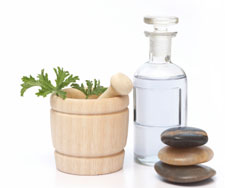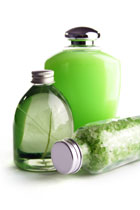Aromatherapy Guide
This aromatherapy guide will help you understand the purported benefits of this ancient holistic approach to enhancing mood and well-being.

Aromatherapy is a form of alternative medicine that works by stimulating your sense of smell using pure, essential oils that are sometimes combined with natural aromatic compounds.
The scents from the oils are thought to have an effect on the limbic system of the brain, which controls emotions, moods, and memory.
As with many holistic treatments, there are varying views in the medical community about the effectiveness of aromatherapy. Some health practitioners view the use of essential oils as a complementary approach to traditional medicine. Others argue that aromatherapy has no effect on wellness. Before trying aromatherapy, consult with your healthcare provider.
Supporters of aromatherapy's positive role point to an array of benefits that are derived, which include:
- Strengthening the immune system
- Killing bacteria and viruses
- Promoting cell growth
- Improving blood circulation
- Relieving anxiety and depression
- Promoting relaxation and equilibrium
Aromatherapy Methods
There are three commonly used methods of using aromatherapy oils. Two involve the oil being absorbed by the skin, the other method is by inhalation. The aromatherapy guide below describes these in more detail.

Aromatherapy Baths
Adding essential oils to your bath is a simple way to enjoy the effects of aromatherapy. The relaxing properties of chamomile, lavender, or sandalwood and a tub or warm water can be a soothing way to unwind and get ready for sleep.
Add 4-6 drops of your chosen oil to your bath water. Then relax in the tub for 15 or more minutes. You can add more than one oil, but don't exceed 8 drops of oil in total. A foot bath is a quick alternative to a soak in the tub. Use a maximum of 3-4 drops for this this application. Talk to your doctor before using essential oils with children of any age, as these oils can have a significant effect.
Massage
No aromatherapy guide would be complete without discussing massage with one or more essential oils. This method involves the absorption of the oils through your skin. The added therapeutic benefits of massage are just a bonus.
It's important never to use undiluted essential oils directly on your skin. They are too strong and need to be blended with milder oils (sometimes called "carrier" oils) such as almond, peach, apricot, jojoba, sunflower, grape-seed, or wheat grass oil.
Although the essential oils are generally considered the important or active part of the aromatherapy treatment, the carrier oils have their own special properties and benefits too. They contain vitamins and minerals, and are excellent moisturizing agents.
To make an aromatherapy massage oil, add 5 drops of essential oil to 10 milliliters or one-third of an ounce a carrier oil. Then, shake well to blend. Lavendar, ylang ylang, melissa or rose are all good choices for a relaxing massage.
Inhalation
The benefits of essential oils can be clearly seen when you use the inhalation method, the basis of aromatherapy. Inhaling is the simplest and most versatile technique. Methods include using an aromatherapy diffuser, vaporizer, oil burner, and aromatherapy candles.
You may need to experiment until you get the desired effect of aromatherapy by mixing and matching different oils and methods.
Related Information - Aromatherapy Guide
More on the Effects of Aromatherapy
Benefits of Aromatherapy
Insomnia Tips
Sleep Disorders
Share Sleep Tips Do you have a great tip to share with others who are struggling with sleep? What works for you might help someone else. |



